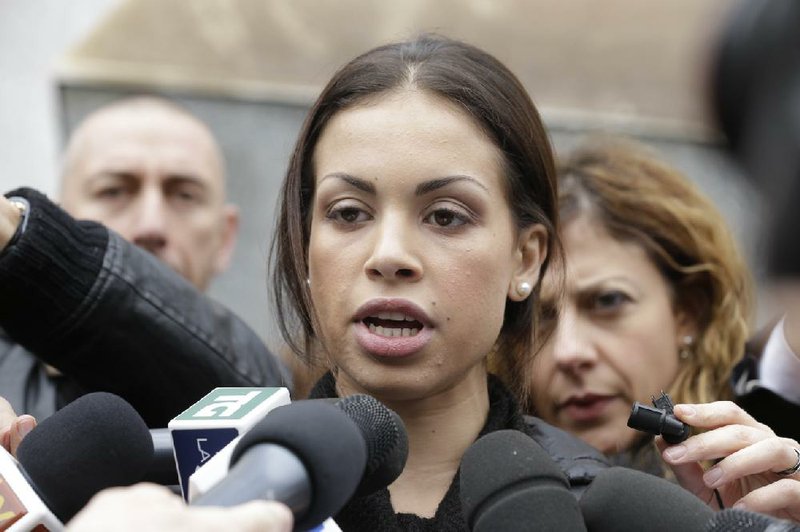MILAN - The Moroccan woman at the center of ex-Premier Silvio Berlusconi’s sex-for-hire trial held a protest Thursday in front of Milan’s courthouse, accusing investigators of waging psychological warfare against her and manipulating her testimony during interrogations.
Karima el-Mahroug, better known as Ruby, read out a six-page statement denying that she was a prostitute, insisting that she had never had sex with Berlusconi and demanding that the court hear her side of the story.
“I have nothing to be ashamed of and nothing to hide,” el-Mahroug said. She denounced what she called “psychological torture” directed at her by people pretending to help her and also accused the media of defaming her.
El-Mahroug admitted, however, that she had lied in the past to hide her poverty-stricken origins.
Berlusconi, 76, is accused of having paid for sex with el-Mahroug while she was a teenager during parties at his villa near Milan, and then trying to cover it up. Both deny sexual contact.
El-Mahroug’s protest came at a politically sensitive time for Italy, as Berlusconi’s center-right party seeks to muscle its way into a governing coalition after coming in second in inconclusive February elections. Parliament is also poised to elect a new president in the coming weeks, a highly politicized process given that the new president will have a major role to play in calling new elections if no government can be formed among Italy’s squabbling political blocs.
El-Mahroug has been the most pivotal character in Berlusconi’s legal woes. The one-time nightclub dancer left her family in Sicily as a young teenager and ended up at dinner parties at the home of the Italian premier as his second marriage collapsed.
The scandal broke in 2010 when it emerged that Berlusconi had intervened with police on el-Mahroug’s behalf after she was accused of stealing nearly $4,000 from a friend and was detained by Milan police. Berlusconi said he intervened to avoid a diplomatic incident, thinking she was a relative of Hosni Mubarak, Egypt’s president at the time.
El-Mahroug on Thursday showed an old passport that identified her last name as “Mubarak” and said that bureaucratic error is why she often told lies and identified herself as a Mubarak relative. She apologized for having created such a “fantasy,” but said she did it to escape the “poverty and suffering into which I was born and grew up in before leaving my family in Sicily.”
In her only other lengthy comments about the case, el-Mahroug told a television interviewer in 2011 that Berlusconi had paid her a little more than $9,000 when she went to his home, but she denied having had sex with him. She also admitted that she had told Berlusconi she was 24 when she was only 17.
El-Mahroug lashed out Thursday at prosecutors, saying they were the source of her suffering for having identified her as a prostitute “even though I always denied having had sex for money, especially with Silvio Berlusconi.”
She described being “a victim of an investigative style in which promises were made and never kept … a method of incessant questioning about my intimate life, my sexual propensities, my lovers, without ever taking into account the discomfort that this would cause in a 17-year-old.”
El-Mahroug said much of what she told prosecutors was never included in the official record, particularly when it became clear that she wouldn’t accuse Berlusconi of having had sex with her.
“And that’s when the subliminal intimidations began, the insults from people who had helped me: real live psychological torture,” she said.
She said, given that she was so pivotal to the case, she couldn’t understand why prosecutors wouldn’t call her as a witness in the trial. She didn’t respond when reporters noted that she had been on Berlusconi’s defense list as a witness but was in Mexico when she was called to testify in December.
She was twice fined for missing court dates, and by the time she returned in January, Berlusconi’s lawyers had changed their strategy and decided they didn’t need to hear from her.
Berlusconi has frequently lashed out at what he calls politically motivated cases against him mounted by Milan magistrates.
Front Section, Pages 8 on 04/05/2013
